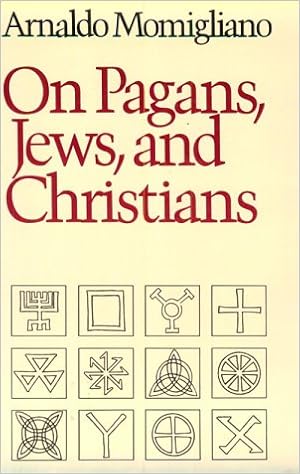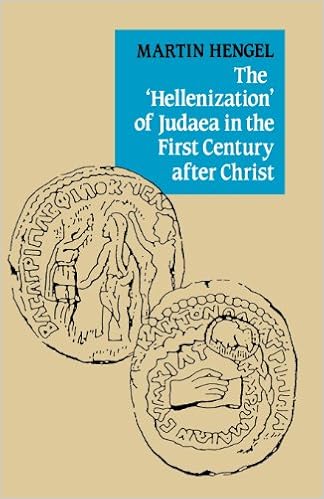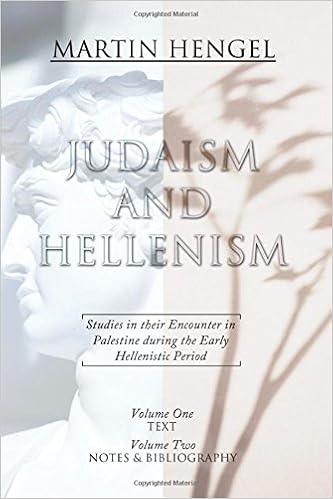Berlin focuses on the animal lust of a woman for a man in
this short piece. I love how the horse gets confused with the rider. Read the
story here at Publishers Weekly.
Tuesday, May 29, 2018
On "On Pagans, Jews, and Christians" by Arnaldo Momigliano ***
This book consists of a collection of lectures. As such, it offers various snapshots revolving around the subject of the title but not a sustained or detailed treatment. This was something of a disappointment to me, though I came to the book with a few lectures specifically in mind as being of interest.
The book starts off with a couple of lectures focused on historiography of the subject at hand, neither essay of which was of particular fascination.
The third chapter deals with the concept of universal history as it developed in the ancient world--the idea of presenting world history as a story, with the foundation of man to the climax of kingdoms. Early world history was often structured around the theme/theory of metals--rising and waining kingdoms that descend through the various qualities of metal (gold, silver, etc.). Another common structure of bodily--world empires as youths, adults, and old people. Polybius writes what he calls the first universal history because he argues that only with the rise of Rome could universal history be written, Rome being the first truly world empire (the gall of this is a bit offputting to me, since other powerful empires existed in the world at the time and since other powerful empires had preceded it).
It is in the fourth chapter that Momigliano starts to cover territory more of interest to me. Here, he focuses on Roman writing about religion--specifically about Roman religion. These writings by Varro and others have largely been lost and are only put together through quotes from others. But there is a move among such writers to bring such religion to the fore; meanwhile, Cicero, who the author spends much time on, after the death of his daughter, largely pushes religion aside.
The fifth chapter discusses how difficult it is to piece together what religious practice was like in the first century BC in Athens, Rome, and Jerusalem. Despite this, the author manages to present some cogent ideas about religious practice in these places, most especially in Rome, where to get a feel for religion, one need only take a walk and observe what festival was being celebrated at a given time.
Next, the author discusses how Roman emperors became gods and what this meant. Some writers during the World War II era argued that the emperors were not so much worshipped as simply given homage--but the distinction is unclear, as writers since they have argued. The author sees the transition as one to make up for a loss of faith in the gods of old--the emperor was a living god, who could help restore faith in the other gods. Also, the worship developed out of worship of dead heroes, which became worship of living local magistrates, which became worship of the emperor, who took on more-and-more nonkingly power.
The next chapters focus on apocalpytic writing. One is a chapter on Josephus and his seeming isolation from apocalyptists writing in his day. Another deals in how writers of the time use apocalyptic pronouncements to oppose Roman rule.
In yet another chapter, Momigliano looks for an in-depth philosophic/theologic argument for polytheism and paganism in the Roman empire akin to that made for monotheism by the Christians. He does not really find it, he denotes, though the last section on the emperor Julian seems to me to provide exactly that. That Julian grew up Christian and turned away from it does mean, however, that he was in many ways arguing as much against Christianity as for paganism. For him, the polytheistic national faiths each served the individual nations within the Roman sphere--pagan gods were in a sense servants of departments of a most high god. Such accounted for cultural differences between peoples (more than the tower of Babel accounts for, which is simply linguistic differences). The proposed rebuilding of the Jewish temple was in this context--that is, as the rebuilding of the temple of one of the national gods, who was subservient to the great god. For Christians, by contrast, Rome eventually came to be an example of the one king/empire uniting the world, just as God would depose it and become supreme. Rome offered peace and thus the ease of the spread of Christianity. And Rome destroyed the temple, because of the Jewish rejection of Jesus.
In the next chapter--and in many chapters following--Momigliano turns to study biographies in the ancient and medieval world. In one, he focuses on Diogenes Laertus, who, he denotes, wrote primarily to promote Greek and pagan ways, completely ignoring the Christian cult that must have been growing up all around him. Other chapters focus on a faux letter between Seneca and a woman named Anna, a comparison between pagan and Christian women as seen in the lives and biographies of an aristocratic family, and a discussion of an autobiography of a medieval convert from Judaism to Christianity (the last section of which discusses the start of the Bar Mitzvah tradition).
Within all this, a chapter on the use of religion in Rome during the Imperial period proves quite valuable, though it is hard to summarize as it is not a terribly thesis-driven essay. Momigliano talks of Rome's adoption of others' pagan faiths, of the return to religious concerns under Augustus, and the foundation of the imperial cult.
The last few chapters of the book appear to be reviews and other ephemera. There is a chapter on Max Weber's use of the term "pariah-religion" to describe Judaism (how it really wasn't appropriate and what Weber's views really were) and a chapter on Jews in Italy (mostly in the twentieth century, before and after World War II). A chapter about how the Romans posed their origins in relation to the Greeks is rather interesting, especially if one has an interest in the Aeneid. The supposition is essentially that the Greeks see themselves as superior insofar as they were immigrants to the land as opposed to emigrants from a land; for the Romans, this distinction was unimportant. But it was important that somehow they relate to the Greeks; this is done through the story in the Aeneid, but that story in part involves a person who deserts the battle of Troy, who is something of an enemy to the Greeks but has to be somehow transformed into something of a friend. The last chapter is a long critique of the work of the linguist Georges Dumezil and his historical sociological work that claimed Indo-European cultures were split in a tripartate function: production, priesthood, and soldiers--Momigliano finds this idea preposterous.
The book starts off with a couple of lectures focused on historiography of the subject at hand, neither essay of which was of particular fascination.
The third chapter deals with the concept of universal history as it developed in the ancient world--the idea of presenting world history as a story, with the foundation of man to the climax of kingdoms. Early world history was often structured around the theme/theory of metals--rising and waining kingdoms that descend through the various qualities of metal (gold, silver, etc.). Another common structure of bodily--world empires as youths, adults, and old people. Polybius writes what he calls the first universal history because he argues that only with the rise of Rome could universal history be written, Rome being the first truly world empire (the gall of this is a bit offputting to me, since other powerful empires existed in the world at the time and since other powerful empires had preceded it).
It is in the fourth chapter that Momigliano starts to cover territory more of interest to me. Here, he focuses on Roman writing about religion--specifically about Roman religion. These writings by Varro and others have largely been lost and are only put together through quotes from others. But there is a move among such writers to bring such religion to the fore; meanwhile, Cicero, who the author spends much time on, after the death of his daughter, largely pushes religion aside.
The fifth chapter discusses how difficult it is to piece together what religious practice was like in the first century BC in Athens, Rome, and Jerusalem. Despite this, the author manages to present some cogent ideas about religious practice in these places, most especially in Rome, where to get a feel for religion, one need only take a walk and observe what festival was being celebrated at a given time.
Next, the author discusses how Roman emperors became gods and what this meant. Some writers during the World War II era argued that the emperors were not so much worshipped as simply given homage--but the distinction is unclear, as writers since they have argued. The author sees the transition as one to make up for a loss of faith in the gods of old--the emperor was a living god, who could help restore faith in the other gods. Also, the worship developed out of worship of dead heroes, which became worship of living local magistrates, which became worship of the emperor, who took on more-and-more nonkingly power.
The next chapters focus on apocalpytic writing. One is a chapter on Josephus and his seeming isolation from apocalyptists writing in his day. Another deals in how writers of the time use apocalyptic pronouncements to oppose Roman rule.
In yet another chapter, Momigliano looks for an in-depth philosophic/theologic argument for polytheism and paganism in the Roman empire akin to that made for monotheism by the Christians. He does not really find it, he denotes, though the last section on the emperor Julian seems to me to provide exactly that. That Julian grew up Christian and turned away from it does mean, however, that he was in many ways arguing as much against Christianity as for paganism. For him, the polytheistic national faiths each served the individual nations within the Roman sphere--pagan gods were in a sense servants of departments of a most high god. Such accounted for cultural differences between peoples (more than the tower of Babel accounts for, which is simply linguistic differences). The proposed rebuilding of the Jewish temple was in this context--that is, as the rebuilding of the temple of one of the national gods, who was subservient to the great god. For Christians, by contrast, Rome eventually came to be an example of the one king/empire uniting the world, just as God would depose it and become supreme. Rome offered peace and thus the ease of the spread of Christianity. And Rome destroyed the temple, because of the Jewish rejection of Jesus.
In the next chapter--and in many chapters following--Momigliano turns to study biographies in the ancient and medieval world. In one, he focuses on Diogenes Laertus, who, he denotes, wrote primarily to promote Greek and pagan ways, completely ignoring the Christian cult that must have been growing up all around him. Other chapters focus on a faux letter between Seneca and a woman named Anna, a comparison between pagan and Christian women as seen in the lives and biographies of an aristocratic family, and a discussion of an autobiography of a medieval convert from Judaism to Christianity (the last section of which discusses the start of the Bar Mitzvah tradition).
Within all this, a chapter on the use of religion in Rome during the Imperial period proves quite valuable, though it is hard to summarize as it is not a terribly thesis-driven essay. Momigliano talks of Rome's adoption of others' pagan faiths, of the return to religious concerns under Augustus, and the foundation of the imperial cult.
The last few chapters of the book appear to be reviews and other ephemera. There is a chapter on Max Weber's use of the term "pariah-religion" to describe Judaism (how it really wasn't appropriate and what Weber's views really were) and a chapter on Jews in Italy (mostly in the twentieth century, before and after World War II). A chapter about how the Romans posed their origins in relation to the Greeks is rather interesting, especially if one has an interest in the Aeneid. The supposition is essentially that the Greeks see themselves as superior insofar as they were immigrants to the land as opposed to emigrants from a land; for the Romans, this distinction was unimportant. But it was important that somehow they relate to the Greeks; this is done through the story in the Aeneid, but that story in part involves a person who deserts the battle of Troy, who is something of an enemy to the Greeks but has to be somehow transformed into something of a friend. The last chapter is a long critique of the work of the linguist Georges Dumezil and his historical sociological work that claimed Indo-European cultures were split in a tripartate function: production, priesthood, and soldiers--Momigliano finds this idea preposterous.
Tuesday, May 15, 2018
On "The Men and Women Like Him" by Amber Sparks (1772 words) ****
In "The Men and Women Like Him" the secret to time travel has been found. However, going back into the past would destroy the space-time continuum, so it's forbidden. This doesn't stop people from sneaking in to try to fix things and save lives. It is the job of another set of characters, called cleaners, to go back in time and stop these "do-gooders." Potentially a story about ethics, it remains too short to be anything more than a novel idea, but I suppose Sparks's goal here is more emotional--how restoring bad for "greater good" hurts. Read the story here at Guernica.
Labels:
1000+ words,
Amber Sparks,
Four-Star Stories,
Guernica,
Stories
On "The 'Hellenization' of Judaea in the First Century after Christ" by Martin Hengel ***
This short follow-up to Hengel's earlier book on Judaism and Hellenism treads familiar ground but also provides a few new tidbits of information that relate directly to the New Testament--and Christianity.
As in the other book, Hengel discusses the importance of the Greek language and education, particularly to attaining social class. In the end, Hengel comes to the conclusion that what is "Greek" and what is "Jewish" is not easily separated. Indeed, as Hengel writes, "Not only Christianity but also rabbinic Judaism, which is different in so many other ways, basically rests on a synthesis."
As in the other book, Hengel discusses the importance of the Greek language and education, particularly to attaining social class. In the end, Hengel comes to the conclusion that what is "Greek" and what is "Jewish" is not easily separated. Indeed, as Hengel writes, "Not only Christianity but also rabbinic Judaism, which is different in so many other ways, basically rests on a synthesis."
Monday, May 14, 2018
On "Unmanageable" by Lucia Berlin (6 minutes) ****
The perils of a drunk (mother) are the subject of this story--how to get a drink so one can function and then get the kids off to school, all this before most liquor stores are open for the day. Listen to the story here at Soundcloud.
Labels:
Audio,
Four-Star Stories,
Lucia Berlin,
Soundcloud,
Stories
On "Judaism and Hellenism" by Martin Hengel ***
This technical book goes to great lengths to discuss just how Greek civilization affected Jewish culture and beliefs in the centuries before Rome's advance.
Hengel discusses how Greek culture impacted Jewish society before it even became an empire--largely through Greek mercenaries. Then he notes how Jewish mercenaries also brought into Jewish culture Greek ideas.
Then there was the language, which became essential to know if you were to be one of the upper class, as it became the lingua franca of the day.
Finally, there was education, which affected Jewish studies as well, even in ways in which Jewish thinkers tried to resist Greek influence. That resistance--the strength of it--was one effect. But even in that resistance, sometimes Greek ideas snuck in, in the form, for example, of formal education or in the idea that anyone could ascend to be a teacher through study and knowledge (as opposed to inherited familial limitations).
A large portion of the book devotes itself to how Greek thought affected Jewish writing. The author takes the position that Ecclesiastes, as well as some other wisdom books, was written after Greece took hold of the Promised Land and then traces the parallels in Greek philosophy to those books. I found this material less intriguing and, at times, ponderous. But the first half of the book provides a lot of information that I found very useful.
Subscribe to:
Posts (Atom)








